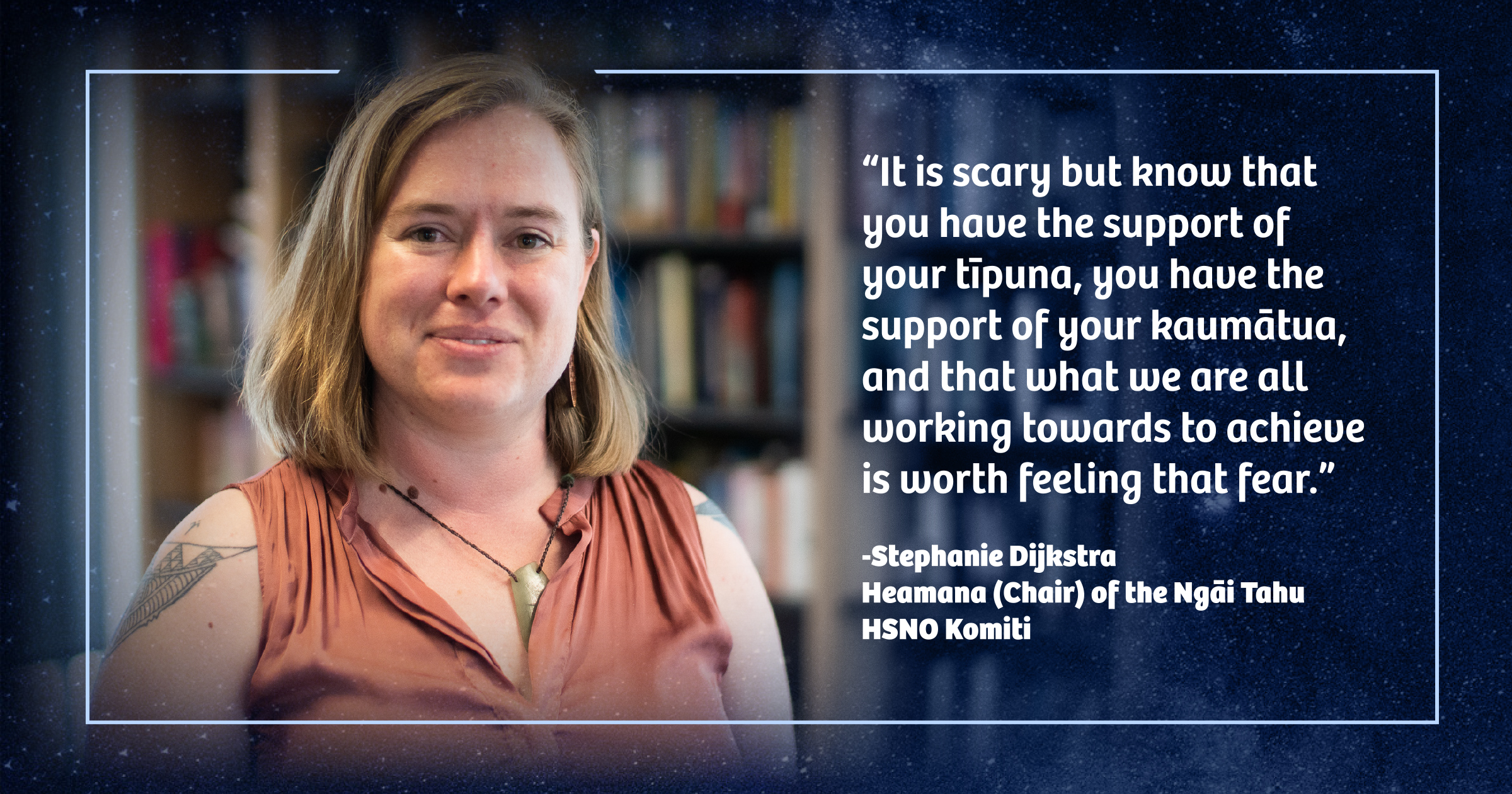Stephanie Dijkstra: Representing Ngāi Tahu in governance and policy
Dec 19, 2022
As one of the youngest Ngāi Tahu external appointees, Murihiku-born Stephanie Dijkstra (Ngāi Tahu and Ngāti Mamoe), says that self-doubt is one of the challenges that she overcomes when representing her Iwi. Stephanie is the current Heamana (Chair) of the Ngāi Tahu HSNO Komiti, a role that she was encouraged to move into by former Chair Edward Ellison.
Te Rūnanga o Ngāi Tahu (Te Rūnanga) HSNO Komiti was established in 2003 and its members are appointed by Te Rūnanga based on their knowledge and expertise in the areas of hazardous substances and new organisms (HSNO). The komiti advocates for tino rangatiratanga and kaitiakitanga on every notified Environmental Protection Act application to bring chemicals with new active ingredients or new organisms into Aotearoa/Te Waipounamu. They also participate in the reassessment process to remove older toxic chemicals from our takiwā.
Stephanie has a bachelor’s degree in Biochemistry and MSc in Plant Biology. She is currently working full time as Mātauranga Taiao Advisor for Storm Environmental, an environmental consultancy service in Ōtautahi.
Fresh out of university, she brought her expertise in Western Science into her first role with the HSNO Komiti in 2018 as an associate member. Her knowledge, expertise and passion quickly shone through and the Komiti decided to offer her full membership not long after she joined. She says, “One of the things I’ve been able to contribute to the komiti is that technical expertise. I was able to build relationships with the agrichemical companies because I spoke their language.”
She said her involvement with the HSNO komiti shaped her career path. “It highlighted to me where I wanted to go in my career and it’s working in the advocacy space between mātauranga and western science.”
“I may not necessarily be the one bringing the mātauranga because I won’t be comfortable doing that until I’m a kaumātua, but I am helping to bring tohunga and scientists together where appropriate to work in partnership.”
Stephanie admits that running her first two meetings as Chair had been terrifying but that she received the full support of the komiti. “We’re a komiti that firmly believes in the kaupapa. They’ve been very kind and helpful as I start to learn how to chair the komiti,” she shares.
Recently Ngāi Tahu external appointees came together to discuss common ground and participate in learning opportunities. A common theme was dealing with institutionalised racism. “Where we’ve struggled is when we are not being treated as a Treaty partner. We are quite lucky in that our komiti has resources, the experience in engaging with the EPA processes and have built relationships as well.”
“We have also always felt supported by Te Rūnanga.”
“We are quite mindful that there are many other Iwi who don’t have the resources to actively engage through submission processes. So where appropriate and where we can get mandate from the wider Te Herenga rōpū, we offer to take on or be the primary drivers of some of that mahi,” explains Stephanie.

Taking on an external appointment role to represent Te Rūnanga o Ngāi Tahu grew Stephanie personally and professionally. She says, “without this appointment and without the impetus to continue being the best mokopuna to my tipuna that I can be, I would have ended up in a lab job working in western science programmes because that’s what I studied.”
“I would never have considered governance and government policy as something I would be interested in, coming from a pure science background.”
“There are a lot of scientists who graduate every year but only a fraction of them are Māori scientists. I would much rather spend time fighting in policy spaces now so that the next generation of Ngāi Tahu scientist do not have to fight to have mātauranga in their thesis.”
She draws inspiration and motivation from her grandmother Madeline McRae a descendant of Tapuku Davis and Caroline Mee. She was a farmer who tried her best to be a kaitiaki, to look after the land for her grandchildren. Stephanie says, “Now that she’s 82, it’s not something that she can take on but I have the ability to do so, to make sure that her great grandchildren and her great great grandchildren are still able to have the memories that I had growing up.”
Remembering her childhood she shares, “When I was in primary school, nana was a huge influence in my life. Nana was the one who taught us how to swim. My grandad was the one who taught us how to fish and appreciate te taiao as well.”
Stephanie encourages other Ngāi Tahu whānau who has the knowledge and expertise to take on external appointments to represent the Iwi.
“It is scary but know that you have the support of your tīpuna, you have the support of your kaumātua, and that what we are all working towards to achieve is worth feeling that fear.”
“Governance is something that with training, support and awhi, you’ll easily pick up. All of us in these boards have the principles of kaitiakitanga and rangatiratanga. Provided that you are standing on those principles, you can’t really go too wrong.”
“At the end of the day, Karawhiua!”
Visit our Te Rūnanga Group careers website today to check out the opportunities that are now available for whānau to represent the Ngāi Tahu perspective in external organisations.
